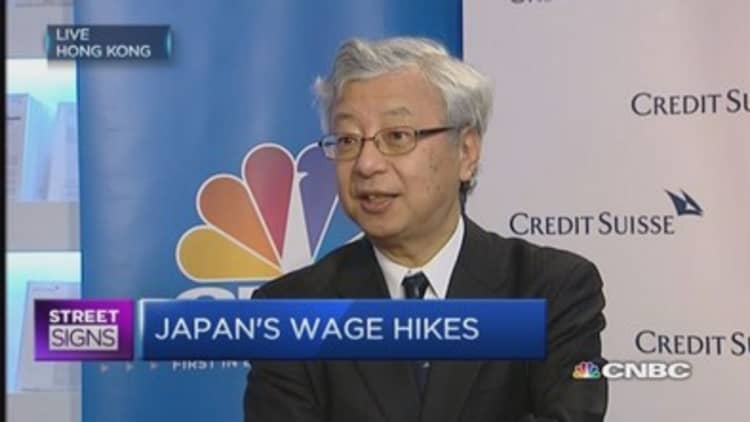Japan continues to flirt with deflation despite two years of massive monetary easing, raising expectations for more stimulus measures, but the central bank's hands may be tied, analysts say.
"The Bank of Japan (BOJ) won't ease again," said BNP Paribas chief economist Ryutaro Kono in a note published last Friday. "One reason is that the government is worried about the negative effects of a weaker yen and isn't keen on more easing."
BOJ Governor Haruhiko Kuroda pledged in April 2013 to drag Japan out of two decades of deflation. He launched an unprecedented quantitative easing program that has seen the yen tumble more than 40 percent against the and Japanese stocks rally by over 50 percent.
The weaker yen has boosted profits among Japan's blue chip exporters and lifted their share prices, but has had the side effect of pushing up import prices.
Read MoreAnalysts still seemore BOJ stimulus coming
Higher prices, which have yet to be offset by the around 50 percent decline in oil prices over the past 12 months, are so unpopular with voters that the government is backing away from its two percent inflation target, said Kono.
According to the minutes for February's monetary policy meeting, the government expects the BOJ "to steadily work to achieve the price stability target of two percent," a less enthusiastic attitude compared with the previous position that the BOJ should pursue quantitative easing (QE) to achieve the two percent target "at the earliest possible time".
"The BOJ is very cautious at this moment because they have already done whatever they can do," Motoshige Itoh, a professor at the University of Tokyo's Graduate School of Economics and a member of Japan's Council on Economic and Fiscal Policy, told CNBC at the 18th annual Credit Suisse Asian Investment Conference on Monday.

Import prices
The weaker yen has driven up prices of household goods in Japan, which depends on imports and was already reeling from a 3 percentage point consumption tax hike last April that tipped the country in to a technical recession.
Food prices have shot up amid the yen's decline, rising 3.3 percent between September and December 2014. Japan imports around 60 percent of its food, according to government data.
Households have been tightening their purse strings in response. In January, household spending fell for the tenth consecutive month, by 5.1 percent on-year.
"The consumption tax hike hit hard household income, and the weaker yen further depressed households' spending power," said BNP Paribas' Kono.
Read MoreReflationist BOJnewcomer no pushover
Don't write more easing off yet
Two issues could still prompt the BOJ to ease monetary policy, according to Kono.
The first is the risk that the U.S. Federal Reserve doesn't raise rates interest rates this year as expected. This could reverse the trend of a stronger U.S. dollar and weaker yen, in turn triggering a sell-off of Japan stocks.
The second is the potential damage Kuroda's reputation may incur if he has to concede that Japan cannot achieve its 2 percent inflation target.
Read MoreBank of Japan in hotseat to produce inflation
"The yen has been sold because investors believe the BOJ and the government's commitment to end deflation. Doubts that the commitment is wavering could trigger a reversal," said Kono.
Several analysts believe that risk alone is enough to push the BOJ to ease again, in October, if not earlier.
"It's a question of time before Kuroda is forced to admit the two percent inflation target cannot be met," JP Morgan's head of Japan economic and policy research Masaaki Kanno told CNBC over the phone.
"The BOJ will have to ease again, in July or October, to prevent disillusioned investors from buying back the yen and selling Japan stocks," he said.

